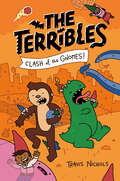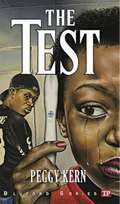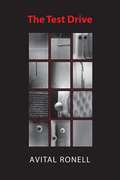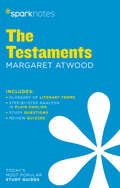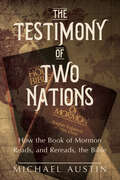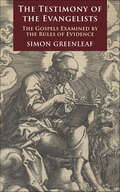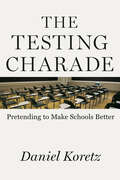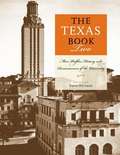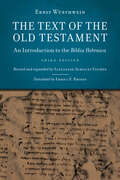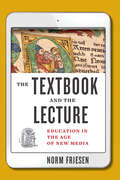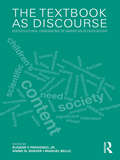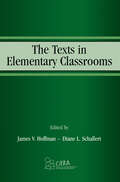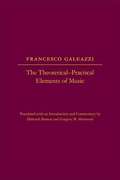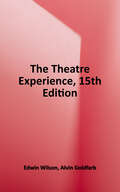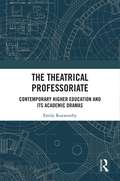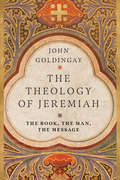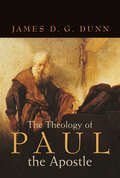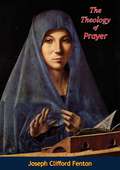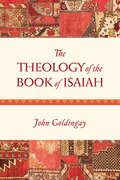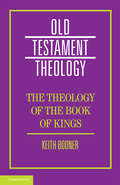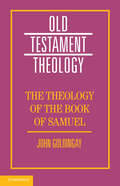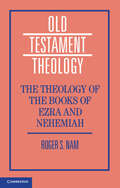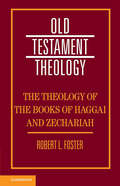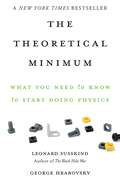- Table View
- List View
The Terribles #3: Clash of the Gnomes! (The Terribles #3)
by Travis NicholsThe Terribles might be monsters, but they're also kids just like you! Well, sort of. This hilarious peek into the world of vampires, mummies, swamp things, and bigfoots is perfect for fans of the Hotel Transylvania movies.THE TERRIBLES HAVE BEEN CHALLENGED to a game of CREEPOBALL, a sport that is played by all monsters on Creep's Cove Island (just don't ask them how to play it--nobody knows ALL the rules!). Their rivals? A horde of relentless, fierce, low-down GNOMES. Can THE TERRIBLES defeat these Gnomes without anyone DISAPPEARING into an ALTERNATE DIMENSION? Why are you asking me? JUST READ THE BOOK, HUMAN!Want to be a little more TERRIBLE? This series is told in alternating chapters, charts, and crafts so you can read about monsters AND be just like one! Neat!DON'T MISS the first two books in the series: #1 Welcome to Stubtoe Elementary and #2 A Witch's Last Resort!
The Test (Bluford Series #17)
by Paul Langan Peggy KernLiselle Mason is in trouble. For weeks, she ignored the changes in her body and tried to forget her brief relationship with Oscar Price, her moody classmate at Bluford High. But when Liselle's clothes stop fitting, and her brother notices her growing belly, she panics. A pregnancy test confirms her biggest fears. Unwilling to admit the truth, Liselle suddenly faces a world with no easy answers. Where will she turn? Who will she tell? What will she do?
The Test Drive
by Avital RonellThe Test Drive deals with the war perpetrated by highly determined reactionary forces on science and research. How does the government at once promote and prohibit scientific testing and undercut the importance of experimentation? To what extent is testing at the forefront of theoretical and practical concerns today? Addressed to those who are left stranded by speculative thinking and unhinged by cognitive discourse, The Test Drive points to a toxic residue of uninterrogated questions raised by Nietzsche, Husserl and Derrida. Ranging from the scientific probe to modalities of testing that include the limits of friendship or love, this work explores the crucial operations of an uncontestable legitimating machine. Avital Ronell offers a tour-de-force reading of legal, pharmaceutical, artistic, scientific, Zen, and historical grids that depend upon different types of testability, involving among other issues what it means to put oneself to the test.
The Test: Why Our Schools are Obsessed with Standardized TestingBut You Don't Have to Be
by Anya KamenetzNo sooner is a child walking and talking than the ABCs and 1-2-3s give way to the full-on alphabet soup: the ERBs, the OLSAT, the IQ, the NCLB for AYP, the IEP for ELLs, the CHAT and PDDST for ASD or LD and G&T or ADD and ADHD, the PSATs, then the ACTs and SATs--all designed to assess and monitor a child's readiness for education. In many public schools, students are spending up to 28% of instructional time on testing and test prep. Starting this year, the introduction of the Common Core State Standards Initiative in 45 states will bring an unprecedented level of new, more difficult, and longer mandatory tests to nearly every classroom in the nation up to five times a year--forcing our national testing obsession to a crisis point. Taxpayers are spending extravagant money on these tests--up to $1. 4 billion per year--and excessive tests are stunting children’s spirits, adding stress to family life, and slowly killing our country’s future competitiveness. Yet even so, we still want our kids to score off the charts on every test they take, in elementary school and beyond. And there will be a lot of them. How do we preserve space for self-directed learning and development, while also asking our children to make the score and make a mark? This book is an exploration of that dilemma, and a strategy for how to solve it. The Test explores all sides of this problem--where these tests came from, why they're here to stay, and ultimately what you as a parent or teacher can do. It introduces a set of strategies borrowed from fields as diverse as games, neuroscience, social psychology, and ancient philosophy to help children do as well as they can on tests, and, just as important, how to use the experience of test-taking to do better in life. Like Paul Tough’s bestseller How Children Succeed, it illuminates the emerging science of grit, curiosity and motivation, but takes a step further to explore innovations in education--emerging solutions to the over-testing crisis--that are not widely known but that you can adapt today, at home and at school. And it presents the stories of families of all kinds who are maneuvering within and beyond the existing educational system, playing and winning the testing game. You’ll learn, for example, what Bill Gates, a strong public proponent of testing, does to stoke self-directed curiosity in his children, and how Mackenzie Bezos, wife of Amazon founder Jeff Bezos and mother of three, creates individualized learning experiences for each of her children. All parents want their children to be successful, and their schools to deliver true opportunities. Yet these goals are often as likely to result in stress and arguments as actual progress. The Test is a book to help us think about these problems, and ultimately, move our own children towards the future we want for them, from elementary to high school and beyond.
The Testaments SparkNotes Literature Guide (SparkNotes Literature Guide Series)
by SparkNotesSimplify studying with this portable literature guide, filled with resources to help you thrive in English class! The Testaments, Margaret Atwood&’s sequel to her groundbreaking The Handmaid&’s Tale, explores issues of power and collective guilt. This literature guide includes a complete plot summary and analysis; key themes, motifs, and symbols; explanation of important quotes; suggested essay topics; and a review quiz. Complete Plot Summary and AnalysisKey Facts About the WorkAnalysis of Major CharactersThemes, Motifs, and SymbolsExplanation of Important QuotationsAuthor&’s Historical ContextSuggested Essay Topics25-Question Review Quiz
The Testimony of Two Nations: How the Book of Mormon Reads, and Rereads, the Bible
by Michael AustinUnderstanding the Book of Mormon on its own terms and through its two-way connection with the Bible Like the Hebrew Bible and the Christian Bible, the Book of Mormon uses narratives to develop ideas and present instruction. Michael Austin reveals how the Book of Mormon connects itself to narratives in the Christian Bible with many of the same tools that the New Testament used to connect itself to the Hebrew Bible to create the Christian Bible. As Austin shows, the canonical context for interpreting the Book of Mormon includes the Christian Bible, the Book of Mormon itself, and other writings and revelations that hold scriptural status in most Restoration denominations. Austin pays particular attention to how the Book of Mormon connects itself to the Christian Bible both to form a new canon and to use the canonical relationship to reframe and reinterpret biblical narratives. This canonical context provides an important and fruitful method for interpreting the Book of Mormon.
The Testimony of the Evangelists: The Gospels Examined by the Rules of Evidence
by Simon GreenleafIn this timeless classic, American layer and jurist Simon Greenleaf's expertly applies his understanding of legal principles to the narratives documenting Jesus' life and teachings in the New Testament. Through a careful analysis Greenleaf concludes the undeniable credibility and authoritative nature of the Gospels, substantiating their status as trustworthy historical records.
The Testing Charade: Pretending to Make Schools Better
by Daniel KoretzFor decades we’ve been studying, experimenting with, and wrangling over different approaches to improving public education, and there’s still little consensus on what works, and what to do. The one thing people seem to agree on, however, is that schools need to be held accountable—we need to know whether what they’re doing is actually working. But what does that mean in practice? High-stakes tests. Lots of them. And that has become a major problem. Daniel Koretz, one of the nation’s foremost experts on educational testing, argues in The Testing Charade that the whole idea of test-based accountability has failed—it has increasingly become an end in itself, harming students and corrupting the very ideals of teaching. In this powerful polemic, built on unimpeachable evidence and rooted in decades of experience with educational testing, Koretz calls out high-stakes testing as a sham, a false idol that is ripe for manipulation and shows little evidence of leading to educational improvement. Rather than setting up incentives to divert instructional time to pointless test prep, he argues, we need to measure what matters, and measure it in multiple ways—not just via standardized tests. Right now, we’re lying to ourselves about whether our children are learning. And the longer we accept that lie, the more damage we do. It’s time to end our blind reliance on high-stakes tests. With The Testing Charade, Daniel Koretz insists that we face the facts and change course, and he gives us a blueprint for doing better.
The Texas Book Two
by David DettmerIn every corner of the sprawling enterprise that is the University of Texas at Austin, you will find teaching, research, artistic creation, and sports achievement that are among the best in the world. Mandated by the Texas constitution to be "a university of the first class," UT Austin strives for excellence across the curriculum, from the most traditional of liberal arts disciplines to the cutting edge of science and technology. For Texans interested in progress, whether students of the university or members of the public, there are few pleasures greater than uncovering the intellectual treasures that can be found by exploring the university's "Forty Acres" and all that they contain. The Texas Book, edited by Richard A. Holland and published in 2006, offered the first in-depth exploration of UT's history and traditions through a collection of profiles, histories, and reminiscences. Now The Texas Book Two continues the story, with a variety of contributors recalling particular events and personalities that have helped shape the university and the people whose lives it has touched. Twenty-one essays present personalities such as John A. Lomax, Anna Hiss, J. R. Parten, Harvey Penick, John W. Hargis, and Jorge Luis Borges; accounts of legislative battles and debates over campus architecture; histories of crown jewels such as the McDonald Observatory and Austin City Limits; and the reminiscences of Barbara Smith Conrad, Sam Hurt, and Cat Osterman, among others.
The Text of the Old Testament: An Introduction to the Biblia Hebraica
by Ernst Wurthwein Alexander Achilles FischerKristin De Troyer — University of St. Andrews &“This finely revised and nicely updated version of one of the classics in our field can truly be called a grand introduction to the history of the biblical text.&”Leonard Greenspoon — Creighton University &“Readers familiar with Würthwein&’s earlier work will discover all of the strengths of his approach to Biblical Hebrew. Old and new readers will enjoy the thoroughly up-to-date discussion of the aims and methods of textual criticism as well as the unbiased analysis of ancient versions and their modern scholarly editions. Beautifully reproduced plates are easy to read, and the updated bibliography is satisfyingly full. . . . This successful project can be easily digested by newcomers and savored by specialists.&”Robert L. Hubbard — North Park Theological Seminary &“A very welcome, thorough revision of the long-honored standard introduction to the Masoretic text. Its integration of recent scholarship is first-rate, and the rewritten text retains the clear, accessible style that won its predecessors decades of popularity as a textbook. Yet another generation of students will find in this book a friendly, reliable guide through the complex terrain of ancient Hebrew texts and their relationships. Highly commended.&”The Bible Today &“Every scholar and serious Bible student should have a passing knowledge of the work of the text critic. This book will provide such knowledge.&”Books at a Glance "An important, up-to-date resource that will benefit everyone interested in Old Testament Textual criticism. The excellent bibliography, diagrams, and plates are unique contributions among introductory works in the field. Highly recommended."
The Textbook and the Lecture: Education in the Age of New Media (Tech.edu: A Hopkins Series on Education and Technology)
by Norm FriesenWhy do the basic technologies of education—the book and the lecture—endure in our digital age?Why are the fundamentals of education apparently so little changed in our era of digital technology? Is their obstinate persistence evidence of resilience or obsolescence? Such questions can best be answered not by imagining an uncertain high-tech future, but by examining a well-documented past—a history of instruction and media that extends from Gilgamesh to Google. Norm Friesen looks to the combination and reconfiguration of oral, textual, and more recent media forms to understand the longevity of so many educational arrangements and practices.Friesen examines the interrelationship of reading, writing, and pedagogy in the case of the lecture and the textbook—from their premodern to their postmodern incarnations. Over hundreds of years, these two forms have integrated textual, oral, and (more recently) digital media and connected them with changing pedagogical and cultural priorities. The Textbook and the Lecture opens new possibilities for understanding not only mediated pedagogical practices and their reform but also gradual changes in our conceptions of the knowing subject and of knowledge itself.Drawing on wide-ranging scholarship in fields as diverse as media ecology and German-language media studies, Foucauldian historiography, and even archaeological research, The Textbook and the Lecture is a fascinating investigation of educational media.
The Textbook as Discourse: Sociocultural Dimensions of American Schoolbooks
by Jr. Eugene F. ProvenzoThe central assumption of The Textbook as Discourse is this: interpreted in the flow of history, textbooks can provide important insights into the nature and meaning of a culture and the social and political discourses in which it is engaged. This book is about the social, political and cultural content of elementary and secondary textbooks in American education. It focuses on the nature of the discourses—the content and context—that represent what is included in textbooks. The term "discourse" provides the conceptual framework for the book, drawing on the work of the French social theorist Michel Foucault. The volume includes classic articles and book chapters as well as three original chapters written by the editors. To enhance its usefulness as a course text, each chapter includes an Overview, Key Concepts, and Questions for Reflection.
The Texts in Elementary Classrooms
by James V. Hoffman Diane L. SchallertThis CIERA sponsored book is based on the premise that high-quality texts of all kinds are essential to good teaching in elementary classrooms. Experts on a variety of text-related topics were asked to summarize existing research and then apply it to literacy development in an "ideal" classroom. The most comprehensive and up-to-date book in its field, it moves progressively from an examination of discrete literacy processes and forms to a holistic overview and assessment of the classroom literacy environment. Content coverage in this outstanding new book includes: *Literacy Processes--Part I examines basic reading processes (instruction, comprehension, word recognition, fluency, and motivation) as they relate to text features.*Forms of Texts--Part II examines the wide variety of text types (fiction, nonfiction, leveled, local, and electronic) that comprise an effective classroom literacy program. Discussions include the nature of these texts, their qualities and quantities, how they fit into an instructional plan, and how a teacher might assess their effectiveness.*Text Selection--Part III examines special issues (linguistic diversity and teachers as censors) related to the selection of classroom texts.*Personal Applications--The final, hands-on chapter synthesizes the book's ideas and offers practical tools (checklists and inventories) whereby teachers can self-assess the literacy environment of their own classrooms.This book is suitable for anyone (graduate students, in-service reading specialists and curriculum directors, college faculty, and researchers) who deal directly with issues of classroom literacy.
The The Theoretical-Practical Elements of Music, Parts III and IV
by Deborah Burton Francesco Galeazzi Gregory W. HarwoodA virtuoso violinist, conductor, composer, and a professor of mathematics and botany, Francesco Galeazzi (1758–1819) firmly believed that musical education should be clear, demonstrable, and practical. In 1791 and 1796, he published the two volumes of his Elementi teorico-practici di musica, a treatise that demonstrated both his thorough grounding in the work of earlier theorists and his own approach to musical study. The first volume gave precise instructions on the violin and how to play it; the second demonstrated his command of other instruments and genres and provided comprehensive introductions to music theory, music history, and music aesthetics. The treatise also addresses the nature of compositional process and eighteenth-century concerns about natural and acquired talent and creativity. This volume offers an unprecedented English translation of the second volume of Elementi teorico-practici di musica, with annotations and commentary. The translation is introduced with a study of Galeazzi's life and milieu, the genesis and sources for the Elementi, and its reception through the present day.
The Theatre Experience
by Edwin Wilson Alvin GoldfarbThe Theatre Experience, 15e prepares students to be well-informed, well-prepared theatre audience members. With an audience-centered narrative that engages today’s students, a vivid photo program that brings concepts to life, and features that teach and encourage a variety of skill sets, students master core concepts and learn to think critically about theatre and the world around them. As a result, students are better prepared for class and better prepared for theatregoing. The textbook is noted for its lively writing style and for helping students recognize how theatre relates to our everyday lives.
The Theatrical Professoriate: Contemporary Higher Education and Its Academic Dramas
by Emily RoxworthyThis book argues that today’s professoriate has become increasingly theatrical, largely as a result of neoliberal policies in higher education, but also in response to an anti-intellectual scrutiny that has become pervasive throughout the Western world. The Theatrical Professoriate: Contemporary Higher Education and Its Academic Dramas examines how the Western professoriate increasingly finds itself enacting command performances that utilize scripting, characterization, surrogation, and spectacle—the hallmarks of theatricality—toward neoliberal ends. Roxworthy explores how the theatrical nature of today’s professoriate and the resultant glut of performances about academia on stage and screen have contributed to a highly ambivalent public fascination with academia. She further documents the "theatrical turn" witnessed in American higher education, as academic institutions use performance to intervene in the diversity issues and disciplinary disparities fueled by neoliberalism. By analyzing academic dramas and their audience reception alongside theoretical approaches, the author reveals how contemporary academia drives the professoriate to perform in what seem like increasingly artificial ways. Ideal for practitioners and students of education, ethnic, and science studies, The Theatrical Professoriate deftly intervenes in Performance Studies’ still-unsettled debates over the differential impact of live versus mediated performances.
The Theology of Jeremiah: The Book, the Man, the Message
by John GoldingayHow do we think about the theology of the book of Jeremiah? Do we consider themes section by section, or do we step back and look at the whole? John Goldingay says "both." In The Theology of Jeremiah, Goldingay considers the prophet Jeremiah himself, his individual circumstances and those of Judah, and his message. Though Jeremiah's message varies throughout the book, we gain insights into Jeremiah's theology by viewing the book in its entirety. In doing so, we learn about God, Israel as the people of God, the nature of wrongdoing and prophecy, and what we know about the future.
The Theology of Paul the Apostle
by James D. DunnIn this major work, James D. G. Dunn brings together more than two decades of vigorous and creative work on interpreting the letters of Paul into an integrated, full-scale study of Paul’s thought. Using Paul’s letter to the Romans as the foundation for constructing a fuller exposition of Paul’s whole theology, Dunn’s thematic treatment clearly describes Paul’s teaching on such topics as God, humankind, sin, christology, salvation, the church, and the Christian life. In the process Dunn engages in a concise way what other important scholars have said regarding each area of inquiry. The Theology of Paul the Apostle represents a major contribution to the ongoing discussion regarding what Paul’s theology is and what its continuing relevance is to the study and practice of religion and theology.
The Theology of Prayer
by Joseph Clifford FentonThe Theology of Prayer, written by one of the twentieth century’s foremost theologians, distills the teachings of Thomas Aquinas, Thomas a Vallgornera, and Joseph a Spiritu Sancto, among other great scholastic theologians, on the nature of Christian prayer, whose writings hold such treasures on praying effectively that their loss would be a tragedy for the people of God.In these pages, Monsignor Fenton clearly and concisely presents to the contemporary reader the scholastics’ works and their insights on Sacred Scripture and Tradition. With The Theology of Prayer, Fenton revitalizes the work of those theologians, preserving their insights and presenting plainly what God has revealed about prayer and how the Church has preserved and expounded that revelation for the good and the salvation of all who believe. “Prayer is something, then, which is instituted, and which is commanded, for our benefit. It tends to make us love God more fully, hope in Him with greater confidence, and serve Him with greater devotion. (Joseph C. Fenton)
The Theology of the Book of Isaiah: Diversity And Unity
by John GoldingayWhat should we make of the sprawling and puzzling book of Isaiah—so layered and complex in its composition? John Goldingay helps us see, hear and understand the grandeur of this prophetic masterpiece among the Prophets as both separate parts and as a whole, clearly tied together with unifying themes.
The Theology of the Book of Kings (Old Testament Theology)
by Keith Bodner1 and 2 Kings unfolds an epic narrative that concludes the long story of Israel's experience with institutional monarchy, a sequence of events that begins with the accession of Solomon and the establishment of the Jerusalem temple, moves through the partition into north and south, and leads inexorably toward the nation's destruction and the passage to exile in Babylon. Keith Bodner's The Theology of the Book of Kings provides a reading of the narrative attentive to its literary sophistication and theological subtleties, as the cast of characters - from the royal courts to the rural fields - are variously challenged to resist the tempting pathway of political and spiritual accommodations and instead maintain allegiance to their covenant with God. In dialogue with a range of contemporary interpreters, this study is a preliminary exploration of some theological questions that arise from the Kings narrative, while inviting contemporary communities of faith into deeper engagement with this enduring account of divine reliability amidst human scheming and rapaciousness.
The Theology of the Book of Samuel (Old Testament Theology)
by John GoldingayThe Old Testament book of Samuel is an intriguing narrative that offers an account of the origin of the monarchy in Israel. It also deals at length with the fascinating stories of Saul and David. In this volume, John Goldingay works through the book, exploring the main theological ideas as they emerge in the narratives about Samuel, Saul, and David, as well as in the stories of characters such as Hannah, Michal, Bathsheba, and Tamar. Goldingay brings out the key ideas about God and God's involvement in the lives of people, and their involvement with him through prayer and worship. He also delves into the mystery and complexity of human persons and their roles in events. Goldingay's study traces how God pursues his purpose for Israel and, ultimately, for the world in these narratives. It shows how this pursuit is interwoven with the realities of family, monarchy, war, love, ambition, loss, failure, and politics.
The Theology of the Books of Ezra and Nehemiah (Old Testament Theology)
by Roger S. NamIn the opening verses of the Book of Ezra-Nehemiah, King Cyrus exhorts the exiled Judeans to return to Jerusalem to restore worship in Jerusalem. It then narrates this restoration through the construction of the temple, the repair of the city walls, and the commitment to the written Torah. In this volume, Roger Nam offers a new and compelling argument regarding the theology of Ezra-Nehemiah: that the Judeans' return migration, which extended over several generations, had a totalizing effect on the people. Repatriation was not a single event, but rather a multi-generational process that oscillated between assimilation and preservation of culture. Consequently, Ezra-Nehemiah presents a unique theological perspective. Nam explores the book's prominent theological themes, including trauma, power, identity, community, worship, divine presence, justice, hope, and others – all of which take on a nuanced expression in diaspora. He also shows how and why Ezra-Nehemiah naturally found a rich reception among emerging early Christian and Jewish interpretive communities.
The Theology of the Books of Haggai and Zechariah (Old Testament Theology)
by Robert FosterTucked away at the end of the Minor Prophets, the Books of Haggai and Zechariah offer messages of challenge and hope to residents of the small district of Yehud in the Persian Empire in the generations after the return from Babylonian exile. In this volume, Robert Foster focuses on the distinct theological message of each book. The Book of Haggai uses Israel's foundational event - God's salvation of Israel from Egypt - to exhort the people to finish building the Second Temple. The Book of Zechariah argues that the hopes the people had in the prophet Zechariah's days did not come true because the people failed to keep God's long-standing demand for justice, though hope still lies in the future because of God's character. Each chapter in this book closes with a substantive reflection of the ethics of the major sections of the Books of Haggai and Zechariah and their implications for contemporary readers.
The Theoretical Minimum: What You Need to Know to Start Doing Physics (The Theoretical Minimum)
by Leonard Susskind George HrabovskyA world-class physicist and a citizen scientist combine forces to teach Physics 101--the DIY wayThe Theoretical Minimum is a book for anyone who has ever regretted not taking physics in college--or who simply wants to know how to think like a physicist. In this unconventional introduction, physicist Leonard Susskind and hacker-scientist George Hrabovsky offer a first course in physics and associated math for the ardent amateur. Unlike most popular physics books--which give readers a taste of what physicists know but shy away from equations or math--Susskind and Hrabovsky actually teach the skills you need to do physics, beginning with classical mechanics, yourself. Based on Susskind's enormously popular Stanford University-based (and YouTube-featured) continuing-education course, the authors cover the minimum--the theoretical minimum of the title--that readers need to master to study more advanced topics.An alternative to the conventional go-to-college method, The Theoretical Minimum provides a tool kit for amateur scientists to learn physics at their own pace.
